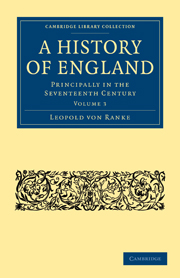Book contents
- Frontmatter
- Contents
- BOOK XI THE COMMONWEALTH IN ENGLAND, 1649—1653
- BOOK XII THE PROTECTORATE OF OLIVER CROMWELL, 1653–1658
- BOOK XIII FALL OF THE PROTECTORATE AND THE COMMONWEALTH. RESTORATION OF THE MONARCHY, 1658—1660
- BOOK XIV THE FIRST FIVE YEARS UNDER CHARLES II. THE RESTORATION OF THE ANGLICAN CHURCH
- CHAP. I The state of affairs at the Restoration
- CHAP. II The Convention Parliament in the summer of 1660
- CHAP. III Foreign policy. Marriages in the Royal Family
- CHAP. IV Religious differences. The Coronation. A new Parliament
- CHAP. V The first two years of the Long Parliament of the Restoration. The Act of Uniformity
- CHAP. VI Relations with France. Sale of Dunkirk
- CHAP. VII A scheme for reunion with Rome. Claim to the dispensing power. Personal relations in Court and State
- BOOK XV THE DUTCH WARS OF CHARLES II. ESTABLISHMENT OF THE PROTESTANT AND PARLIAMENTARY CHARACTER OF THE CONSTITUTION 1664—1674
CHAP. V - The first two years of the Long Parliament of the Restoration. The Act of Uniformity
Published online by Cambridge University Press: 07 June 2011
- Frontmatter
- Contents
- BOOK XI THE COMMONWEALTH IN ENGLAND, 1649—1653
- BOOK XII THE PROTECTORATE OF OLIVER CROMWELL, 1653–1658
- BOOK XIII FALL OF THE PROTECTORATE AND THE COMMONWEALTH. RESTORATION OF THE MONARCHY, 1658—1660
- BOOK XIV THE FIRST FIVE YEARS UNDER CHARLES II. THE RESTORATION OF THE ANGLICAN CHURCH
- CHAP. I The state of affairs at the Restoration
- CHAP. II The Convention Parliament in the summer of 1660
- CHAP. III Foreign policy. Marriages in the Royal Family
- CHAP. IV Religious differences. The Coronation. A new Parliament
- CHAP. V The first two years of the Long Parliament of the Restoration. The Act of Uniformity
- CHAP. VI Relations with France. Sale of Dunkirk
- CHAP. VII A scheme for reunion with Rome. Claim to the dispensing power. Personal relations in Court and State
- BOOK XV THE DUTCH WARS OF CHARLES II. ESTABLISHMENT OF THE PROTESTANT AND PARLIAMENTARY CHARACTER OF THE CONSTITUTION 1664—1674
Summary
On May 8, 1661, the new Parliament was opened. At seven o'clock in the morning the King's Master of the Ceremonies, the Duke of Ormond, appeared as of old in the Court of Requests, in order himself, or by a deputy whom he appointed, to receive the oaths anciently imposed upon the members elected to the Lower House. These were the Oath of Supremacy, as it had been drawn up in the first year of Queen Elizabeth, and the Oath of Allegiance dating from the seventh year of King James, both of them religious as well as secular in their import. For it was thought desirable to link together the present and the old system with its union of loyalty and religion. Those who had taken the oaths withdrew first of all to their own House, and thence, on the usual summons, to the House of Lords, where the King was present in person, surrounded with all the traditional pomp of earlier times. Arrayed in the royal robes and wearing the crown on his head he delivered the speech from the throne.
It is not merely by successive governments, but also, and this especially since the latter have become so powerful, by successive Parliaments that we distinguish the various epochs of English history. However great the influence exercised by all governments upon the elections, yet they can never wholly suppress the elements of independence, which in the course of the sessions invariably grows in strength.
- Type
- Chapter
- Information
- A History of EnglandPrincipally in the Seventeenth Century, pp. 365 - 379Publisher: Cambridge University PressPrint publication year: 2010First published in: 1875

